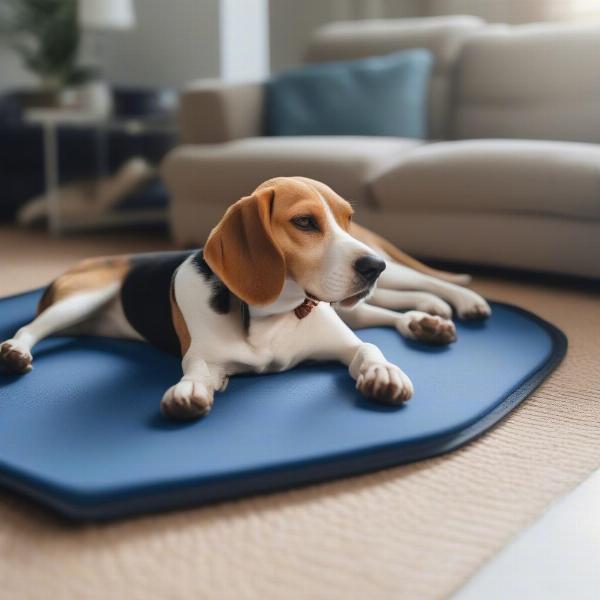The phrase “no ice water for dogs” has been circulating online, causing concern among pet owners. While the idea that ice water is harmful to dogs isn’t entirely accurate, there are some nuances to consider. This article will debunk the myth, explore the potential risks of giving your dog ice water, and offer safe and refreshing alternatives to keep your furry friend cool and hydrated, especially during hot weather.
Is Ice Water Really Dangerous for Dogs?
The notion that ice water causes bloat in dogs is a common misconception. While bloat is a serious and potentially life-threatening condition, there’s no scientific evidence directly linking it to ice water consumption. Bloat, or Gastric Dilatation-Volvulus (GDV), occurs when a dog’s stomach fills with gas and then twists, cutting off blood supply. While the exact cause of bloat is unknown, factors like rapid eating, large meals, and deep-chested breeds are considered higher risk.
However, giving your dog very cold water, including ice water, can lead to some minor discomfort. Some dogs may experience a temporary brain freeze sensation, similar to what humans experience when consuming something very cold too quickly. This can cause a brief headache or discomfort, leading them to shy away from water altogether. For dogs that are already overheated, very cold water can also shock their system.
Safe Hydration for Your Canine Companion
So, what’s the best way to keep your dog hydrated? Room temperature water is generally the safest and most comfortable option for dogs. It allows them to drink at their own pace without the risk of a brain freeze or system shock. Ensure fresh water is always available, especially during warmer months or after strenuous exercise.
Cooling Down Your Dog Safely
Instead of ice water, consider other ways to help your dog beat the heat:
- Cooling mats: These mats are designed to absorb body heat and provide a cool surface for your dog to lie on.
- Frozen treats: Freeze dog-friendly fruits and vegetables, like bananas or carrots, for a refreshing and hydrating snack.
- A shady spot: Ensure your dog has access to a cool, shaded area, especially during the hottest part of the day.
- Short, frequent walks: Avoid strenuous exercise during hot weather and opt for shorter walks in the cooler parts of the day.
- A shallow pool: If your dog enjoys water, a shallow paddling pool can be a great way for them to cool off.
 Dog relaxing on a cooling mat
Dog relaxing on a cooling mat
When to Consult a Vet
While minor discomfort from cold water is usually temporary, contact your veterinarian if your dog exhibits any unusual symptoms after drinking cold water, such as vomiting, diarrhea, or difficulty breathing. These could be signs of a more serious issue.
Conclusion
Offering your dog ice water isn’t necessarily dangerous, but it’s not the most ideal way to keep them hydrated. Room temperature water is the safest and most comfortable choice. By providing fresh water, shade, and other cooling methods, you can ensure your furry friend stays happy and hydrated all summer long. Remember, “no ice water for dogs” isn’t a hard and fast rule, but a reminder to prioritize your dog’s comfort and well-being.
FAQ
- Is it okay to give my dog ice cubes? While a few ice cubes are generally safe, avoid giving your dog large quantities of ice, as it could potentially cause digestive upset.
- What are the signs of bloat in dogs? Signs of bloat include a distended abdomen, excessive drooling, restlessness, and attempts to vomit without success.
- What should I do if I think my dog has bloat? If you suspect your dog has bloat, seek immediate veterinary attention. Bloat is a medical emergency that requires prompt treatment.
- Can I add flavor to my dog’s water? You can add dog-friendly flavors, such as low-sodium chicken broth or bone broth, to encourage your dog to drink more water.
- How much water should my dog drink per day? A general guideline is that a dog should drink about one ounce of water per pound of body weight per day. However, this can vary depending on factors like activity level, weather, and diet.
- Can I give my dog electrolyte water? Electrolyte water can be beneficial for dogs after strenuous exercise or during periods of illness, but consult your vet before giving it regularly.
- What are some signs of dehydration in dogs? Signs of dehydration include dry gums, sunken eyes, loss of skin elasticity, and lethargy.
About ILM Dog
ILM Dog is your trusted global resource for expert dog care advice. We offer practical guidance on all aspects of dog ownership, from breed selection and training to nutrition, health, and grooming. Our mission is to empower dog owners worldwide with the knowledge and resources they need to provide the best possible care for their furry companions. For expert advice on dog care, contact us at [email protected] or call us at +44 20-3965-8624.